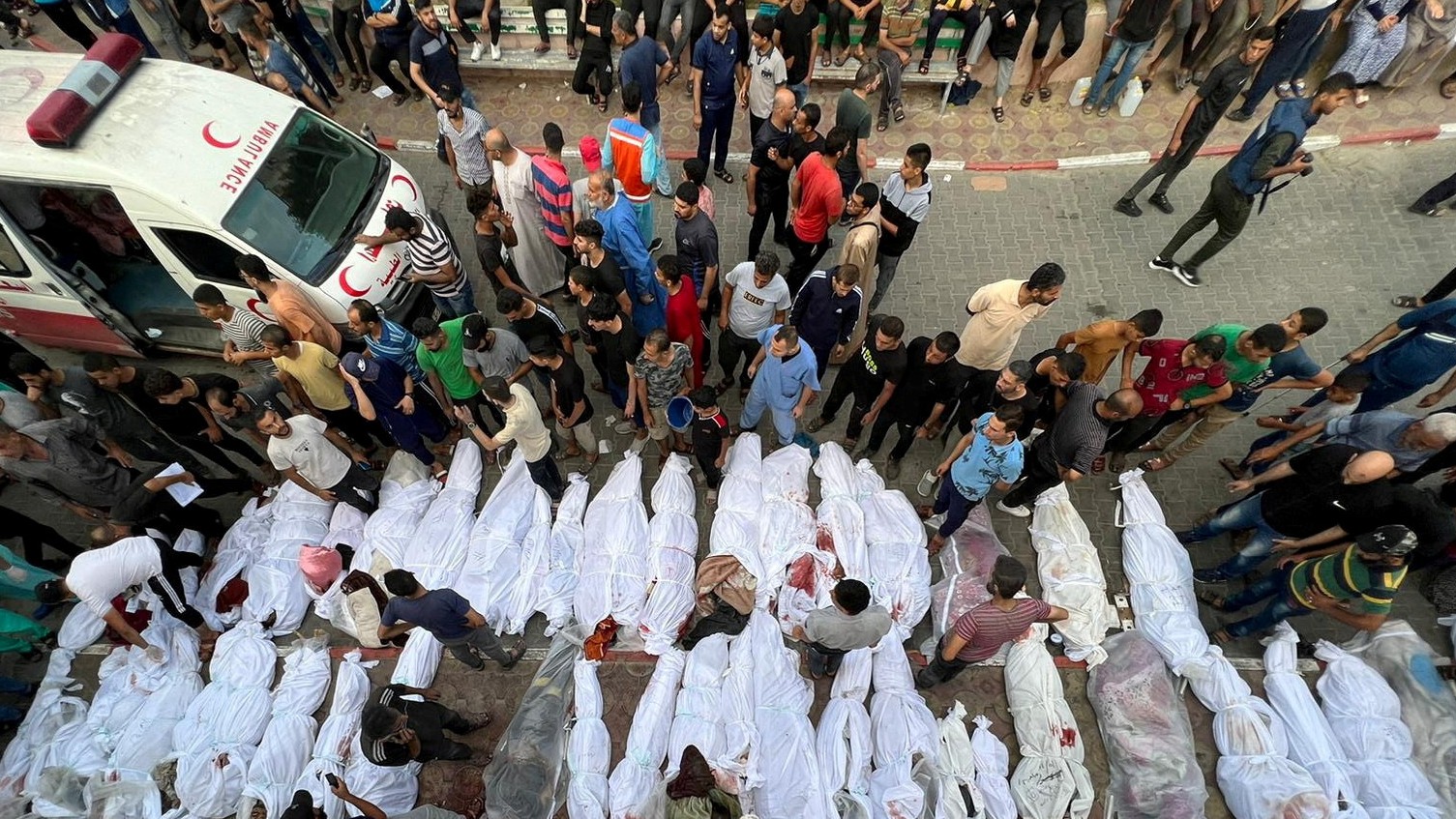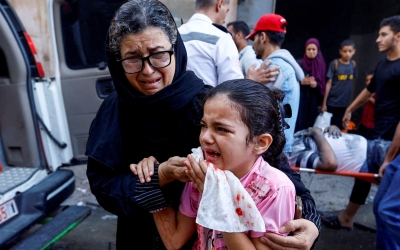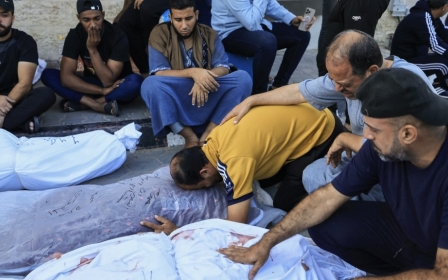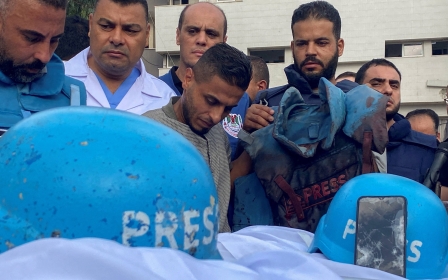Israel-Palestine war: Was Israel’s attack on Jabalia camp a war crime or 'legally justified?'
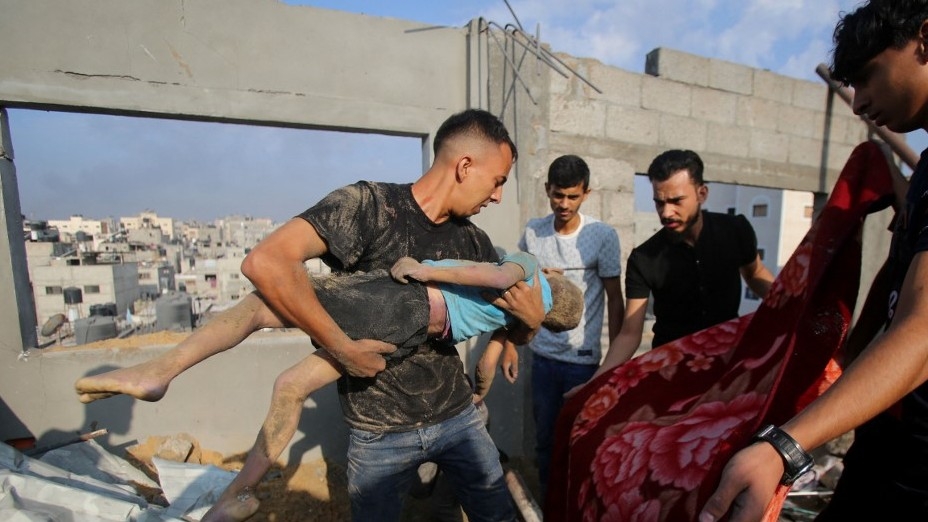
A remark by a British politician stating that deadly Israeli air strikes on a refugee camp in Gaza on Tuesday “can be legally justified” has sparked widespread criticism and questions about the legality of Israel's bombardment of the besieged enclave.
An estimated 100 Palestinian civilians were killed as a result of the Israeli strike, which targeted a residential building complex at the Jabalia camp north of the Gaza Strip.
Asked whether the attack was proportionate, UK Shadow Foreign Secretary David Lammy told BBC Radio 4's Today programme: "Israel have said that they’ve killed important Hamas commanders.
"And of course, they’ve said and reminded the world that Hamas do rely on human shields but I woke up this morning to the heartbreaking and horrific images of a massive crater where people lay clearly under rubble, he said.
“I think it is important for Israel to explain how this conforms with the laws of war, how does it qualify as proportionate because clearly those scenes are very troubling, Lammy added.
New MEE newsletter: Jerusalem Dispatch
Sign up to get the latest insights and analysis on Israel-Palestine, alongside Turkey Unpacked and other MEE newsletters
“When it comes to the ethics, it’s clear to me that it’s wrong to bomb a refugee camp but clearly if there is a military objective it can be legally justifiable. It’s for Israel to explain its actions.”
In a follow-up tweet seeking to clarify the comments, Lammy said that he was "appalled" by civilian deaths in the camp, and called on Israel to clarify how it "conforms to international law".
The Palestinian interior ministry said there were a total of 400 dead and wounded from the attack.
'Carrying out military attacks in urban areas and in civilian refugee camps where thousands of innocent people live is always going to result in massive civilian casualties'
- Craig Jones, Newcastle University
A spokesperson for the Israeli military claimed the air strike on the Jabalia refugee camp killed Hamas commander Ibrahim Biari, who they said had played a role in the group's attack.
A subsequent Israeli attack on Wednesday on the same camp killed dozens of Palestinians, in what the health ministry described as another "massacre". The death toll has not yet been confirmed.
Jabalia camp is the largest of eight refugee camps in the besieged Gaza Strip, housing over 116,000 people officially registered with Unrwa, the United Nations agency for Palestinian refugees. The actual number of people in the camp is likely to be much higher.
Craig Jones, senior lecturer in political geography at Newcastle University, said the attack on a densely populated refugee camp like Jabalia would naturally result in large civilian casualties.
"Carrying out military attacks in urban areas and in civilian refugee camps where thousands of innocent people live is always going to result in massive civilian casualties, and the Israeli military both know and anticipate much of the harm they cause – it is part of their operational and strategic calculation," he told Middle East Eye.
Commenting on Lammy's remarks, Jones said: "I think the international community needs to look very carefully at the legal justification and not merely leave it to Israel to 'explain its actions' as if the mere whiff of legal explanation is sufficient for exoneration."
"If the attack is deemed proportionate, we need to have a thorough look at the law and how it is being applied. If the attack violated the principle of proportionality, then war crimes may have been committed," he argued, adding that an independent investigation should take place either way to establish the facts.
Israel's relentless bombardment of the besieged enclave came after Hamas's surprise attack on southern Israeli communities on 7 October, which killed around 1,400 Israelis, most of them civilians, according to the Israeli government. Roughly 240 Israelis were also taken to Gaza as captives.
The casualties from Tuesday’s bombardment brought the total number of Palestinian deaths since the start of Israel's retaliatory operation on Gaza to more than 8,796, including 3,648 children killed in bombings of homes, hospitals and civilian buildings.
The Palestinian health ministry has published an extensive document with the names and details of all those killed.
Meanwhile, Palestinian officials have estimated that since 7 October at least 200,000 residential buildings have been targeted with air strikes across the Gaza Strip. These constitute nearly 50 percent of the total residential units in Gaza.
War crimes
Lammy’s comments appeared to align with the Israeli government’s position justifying the ferocious military campaign as proportional to its declared target of eradicating Hamas in Gaza.
Senior Israeli government officials have even described the Palestinians collectively as “human animals”, and repeatedly accused Hamas of using civilians as human shields.
But international human rights groups and UN experts have described the bombing campaign as indiscriminate and potentially amounting to war crimes.
Yasmine Ahmed, UK director at Human Rights Watch, said that her organisation has documented "serious violations of the laws of war by Israeli forces and by Palestinian armed groups".
"Israel has repeatedly carried out indiscriminate air strikes that killed scores of civilians – wiping out entire families – and strikes that targeted civilian infrastructure with no evidence of military targets in the vicinity," she told Middle East Eye.
"Israel’s bombardment of densely populated areas raises concerns under international humanitarian law," she added.
"International humanitarian law is clear. It is prohibited to carry out an indiscriminate attack, one that does not distinguish between a civilian and military target, and one that is disproportionate, where the expected harm to civilians and civilian properties is disproportionate to the anticipated military gain."
Parties to the conflict between Israel and Palestinian groups are obliged under international law to respect the principles of distinction and proportionality, both of which have been recognised as part of customary international law by the International Committee for the Red Cross (ICRC).
According to the principle of distinction, parties to the conflict are only permitted to target combatants and must not target civilians.
'Israel has repeatedly carried out indiscriminate air strikes that killed scores of civilians – wiping out entire families – and strikes that targeted civilian infrastructure with no evidence of military targets in the vicinity'
- Yasmine Ahmed, HRW
Additionally, according to a 2005 ICRC study that outlined rules of customary international humanitarian law, the principle of proportionality prohibits both parties of an armed conflict from launching an attack "which may be expected to cause incidental loss of civilian life, injury to civilians, damage to civilian objects, or a combination thereof, which would be excessive in relation to the concrete and direct military advantage anticipated."
Violations of the above rules makes members of the Israeli army and government potentially liable for prosecution for war crimes under international criminal law.
Although Israel is not a party to the First Additional Protocol to the Geneva Conventions, which enshrines the principle of proportionality in articles 51 and 57, it is still bound by customary international law which, unlike treaties, applies to all states regardless of their ratifications of relevant treaties.
Additionally, under international law, Israel is considered an “occupying power” in Gaza, since the 1967 Middle East war. Even after its military withdrawal from Gaza in 2005, it remained an occupying power due to its effective control on the Gaza Strip through the imposition of a land, sea and air blockade.
An occupying power, according to the 1907 Hague Regulations and the Fourth Geneva Convention, is responsible for the protection of the lives and private property of the civilian population.
Israel is a state party to the Geneva Conventions and is bound by the provisions of the Hague Regulations despite not being a party to the latter- now considered customary international law.
Last month, following the beginning of hostilities, 50 UN experts, while also condemning the Hamas attack, described the Israeli campaign in Gaza as "collective punishment".
"Indiscriminately killing civilians in the context of hostilities, with no regard for the principles of distinction, precaution and proportionality, is a war crime," the UN experts said.
Middle East Eye delivers independent and unrivalled coverage and analysis of the Middle East, North Africa and beyond. To learn more about republishing this content and the associated fees, please fill out this form. More about MEE can be found here.


